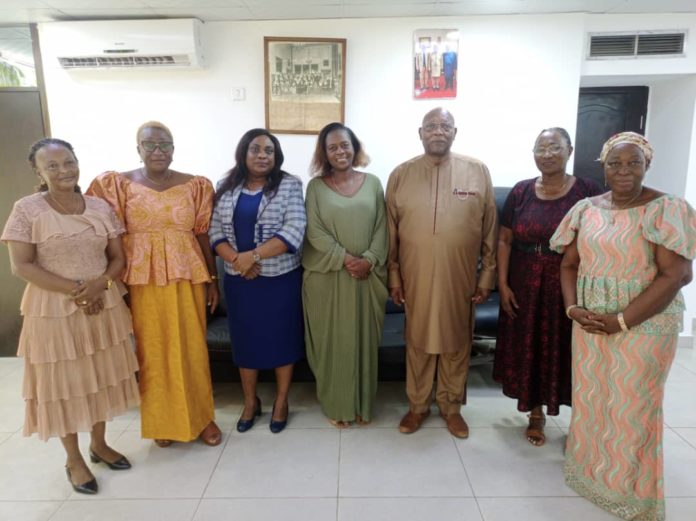By Amin Kef Sesay
Following a petition submitted to the Speaker of Parliament, in his Chambers at Parliament Building by Anti-FGM Campaigners led by Rugiatu Nenneh Koroma nee Turay for onward transmission to the Head of State, and Leaders of political parties in Parliament, with a view to outlawing FGM practices in Sierra Leone, excluding the Bondo Society, Hon. Dr. Abass Chernor Bundu has disclosed that he has consented to the task of presenting the memorandum to the Head of State as well as to the Leaders of political parties in Parliament on behalf of Anti-FGM Campaigners.
He made it categorically clear that he was not against the Bondo Society, but shared the concern of the campaigners that FGM be outlawed in the country, whilst acknowledging that it might sound unpalatable to a certain section of society for traditional reasons. He also stated that he knew it was hard to change tradition, but as a great believer in change, good traditions needed to be preserved while discarding bad ones.
He further stated that no society could afford to remain backward and primitive forever and that it was natural for countries to go through an evolutionary process and Sierra Leone is no exception.
He said that the time has come for our country to evaluate its cultural practices and decide as a people what is good to be preserved and what is not good to be discarded. He further added that this should be done not by force, but by persuasion and affirmed that there is already a Standing Committee on FGM in Parliament.
In a related development, Women’s rights organizations across the country and around the world have on the 1st February, 2022 come together to co-sign an open letter calling on the Government of Sierra Leone to criminalize Female Genital Mutilation (FGM) and protect women and girls from the harmful practice. Such came in the wake of the tragic death that was attributed to FGM.
It could be recalled that on the 20th December 2021, 21-year-old Maseray Sei allegedly died from acute bleeding and shock a day after being subjected to FGM, and such was confirmed by the post-mortem carried out on 14 January.
Also, few days following Maseray’s death, in a different region, a 15-year-old girl was admitted to hospital for urgent treatment after suffering serious complications due to FGM.
Sadly, these are not isolated incidents in Sierra Leone. Many women and girls in recent years have died or experienced devastating harm as a result of FGM, and during the latest holiday period, there were widespread reports of hundreds of young women and girls being cut.
Sierra Leone has one the highest FGM prevalence rates in Africa, with 83% of women and girls aged between 15 and 49 years having undergone the procedure according to the 2019 Demographic Health Survey.
Internationally recognized as a gross human rights violation, FGM involves the partial or total removal of the external female genitalia or other injury to the female genital organs for non-medical reasons. It is a form of violence against women and girls, a manifestation of gender inequality and discrimination, and recognized by the United Nations as a form of torture.
Short term complications arising from FGM include: hemorrhaging; infections; severe pain; urine retention and other urinary tract problems; and psychological trauma. As with Maseray Sei and other victims, FGM can also result in death.
Longer term effects include: chronic infections, cysts, and ulcers; painful scar tissue; problems affecting the bladder, uterus, and kidneys; sexual health issues; mental health issues; infertility; menstrual complications; difficulties during childbirth, and an increased risk of infant and maternal mortality.
According to the Chairperson of the Amazonian Initiative Movement, Rugiatu Neneh Turay, who has been very vociferous in leading the campaign against FGM, despite the harm caused by FGM, the Government of Sierra Leone has failed to criminalize the harmful practice. She underscored that the country’s penal code does not specifically prohibit FGM, and there have been no known prosecutions relating to FGM.
“Furthermore, gender discrimination in Sierra Leone means that existing laws that are meant to uphold the rights of women and girls are not being effectively implemented to protect against FGM or punish perpetrators,” she asserted.
She argued that the failure to criminalize FGM has been further aggravated by a widespread lack of political will to end the harmful practice and the failure by the State to explicitly condemn FGM.
The signatories of the open letter are calling on the Government of Sierra Leone, H.E. President Julius Maada Bio, and Attorney General Mohamed Lamin Tarawalley Esq. to urgently enact a law that explicitly bans FGM for all ages, puts in place adequate measures to protect against and eliminate FGM and give survivors and the families of victims a means to access justice.
They strongly condemned the actions of politicians who are supporting FGM and equally commended the politicians and other duty bearers who have spoken out and taken action against the harmful practice as well as call on others to join them.
The women rights organizations also asked the State to prosecute all offenders putting the lives of women and girls at risk stating that it should include a comprehensive and swift police investigation and prosecution of all those responsible for the death of Maseray Sei maintaining that it is vital that justice is served in this case and is seen to be served so that it can deter others from committing FGM.




